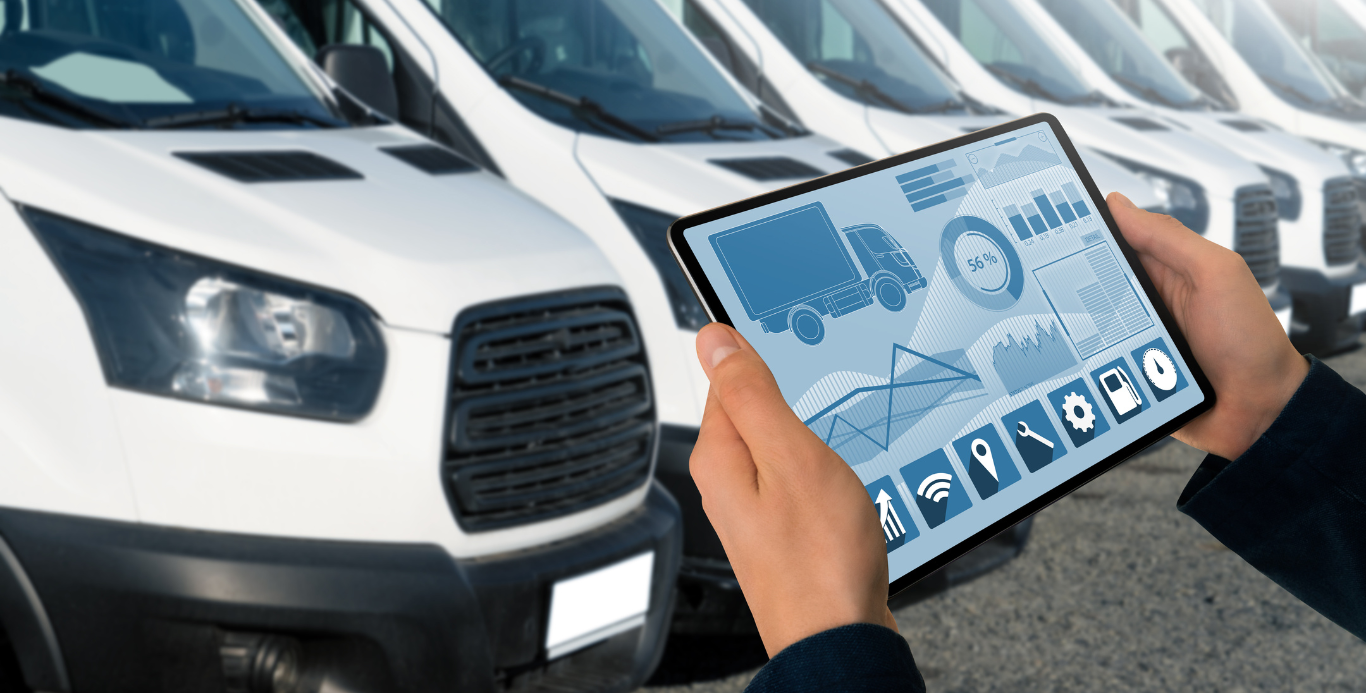888.711.RISK

Top 7 Benefits of Telematics: Reduce Risk and Lower Costs
If you’ve ever watched your Amazon package wind its way through your neighborhood and to your doorstep, you can thank telematics.
What is telematics and how can you use it to improve your business’s bottom line? Let’s dig in.
What is telematics?
Telematics is the use of technology to monitor vehicles, equipment, and other assets. Depending on the system, the tech might use cameras, sensors, OBD ports, GPS, cellular networks, satellite communications, bluetooth, cloud connections, or any combination of these.
A telematics device can track a wide variety of data points and events, such as:
- Location
- Speed
- Idle time
- Sudden acceleration and braking
- Fuel level and consumption
- Vehicle maintenance issues
- Vehicle tipping or rollover
Where telematics is used
The most common business application of telematics technology is fleet tracking. Companies install the technology in every car or truck to collect data that helps maximize efficiency and identify concerns.
However, industry-specific solutions offer more specialized tracking tailored to the industry’s needs. Other industries that often use telematics are:
- Personal auto insurance
- Construction
- Agriculture
- Public services
Telematics in personal auto insurance
Telematics became widely known when personal auto insurance carriers introduced usage-based insurance models. These companies use telematics technology to gather data on a policyholder’s driver behavior, and then offer personalized premium rates based on the driver’s risk profile.
Telematics in construction
Because construction companies use high-value equipment, investing in telematics has a high ROI in this industry. The technology helps prevent equipment theft as well as damage due to deferred maintenance or improper use.
Telematics solutions can also help construction leaders allocate equipment within tight project schedules and prevent employee injuries.
Telematics in agriculture
Farming and agriculture operations use telematics in some of the same ways as construction businesses. The tech can monitor heavy equipment to ensure preventative maintenance and safe operator behavior.
Some solutions also help businesses optimize planting and harvesting, monitor crop health, and allocate resources efficiently.
Telematics in public services
Municipalities and other public entities have a variety of opportunities to increase efficiency with telematics. Vehicle tracking on buses and trains can provide real-time arrival times and optimize route planning.
Tracking utility and waste management vehicles can create valuable visibility into maintenance needs, locations, fuel consumption, and a wide range of analytics to optimize operations.
7 benefits of telematics for businesses
Investing in telematics technology now can help you improve your safety program, run your business efficiently, and save money over time. Here are seven powerful benefits of telematics for businesses.
1. Increased operational efficiency
Robust visibility into real-time equipment use improves efficiency in a variety of ways by empowering you to:
- Understand and improve equipment allocation across job sites
- Identify training needs at employee and companywide levels
- Reduce manual on-site reporting by making data available virtually
Some telematics solutions, like T3’s Construction Fleet Telematics, provide other actionable insights to manage staff scheduling, compliance, labor costs, work orders, inventory, vendor management, and more.
2. Safer operator behavior
Vehicle accidents and contact with equipment are two of the top three causes of work-related deaths in the U.S. These types of incidents not only cause severe injuries and death, but also cost businesses:
- Medical expenses
- Lost work time
- Costly property damage
- Premium increases
Improving the safety of vehicle and equipment operators can reduce these risks and save lives. Telematics devices help you identify and correct unsafe behaviors before they cause accidents.
3. Easier regulatory compliance
Safety and compliance go hand-in-hand. Telematics can ease companies’ compliance burden, especially in sectors with strict regulations like construction, with features to track:
- Working hours
- Noise levels
- Emissions
- Maintenance intervals
Automating the tracking and reporting on these factors helps you maintain compliance while avoiding violations, fines, and disruptions caused by noncompliance.
4. Fewer equipment breakdowns
When your business owns expensive equipment, unexpected breakdowns are an issue you can’t afford. They rack up costly repairs and put your equipment out of commission for days or weeks – causing project delays and unhappy clients.
Telematics systems can:
- Alert you when routine maintenance is coming up, helping you prevent breakdowns and prolong your equipment’s life
- Notify you if maintenance or fleet performance issues are detected, so you can address them before they turn into big problems
5. Reduced risk of equipment theft
The average cost of a single instance of construction equipment theft is about $30,000 – and only one in five stolen pieces of equipment is ever recovered.
Telematics technology prevents unauthorized activation and alerts you if unexpected activity occurs. If a vehicle or equipment is stolen, the location tracker helps you and the authorities act quickly to recover stolen equipment.
6. Improved fuel efficiency
Safe driving habits like slower driving are inherently tied to lower fuel costs. In addition, telematics tools can help you optimize vehicle routes and refuel efficiently.
The IRS also offers a fuel tax credit for businesses purchasing fuel to power off-highway equipment. Because the federal government mainly uses fuel taxes for public highway maintenance, some businesses are eligible for refunds of the fuel tax they’ve paid. This includes companies in industries like:
- Construction
- Farming
- Landscaping
- Manufacturing
Telematics data can provide supporting evidence that vehicles had off-highway fuel usage only. If you think you qualify for this credit, ask your accountant or financial advisor for more information.
7. Lower insurance premiums
Investing in telematics often helps business owners save money on insurance. It can lower your premiums over time in several ways, by:
- Showing your carrier you’re invested in risk mitigation
- Helping you stand out during the underwriting process
- Providing data to prove your telematics solution’s impact
- Improving your claims history, which influences insurance costs
Policyholders’ use of telematics lowers claims costs for carriers by arming claims adjusters with reliable data. For this reason, some insurance companies may offer discounts or incentives for investing in the tech.
Telematics is your competitive advantage
Investing in a telematics system sets your business apart from competitors who aren’t using it. All the benefits of telematics add up to a distinct competitive advantage by reducing operational costs and creating a safe, positive work environment.
The best part is, the benefits of telematics can easily scale. As your business grows, you can apply the technology and practices to new equipment and team members without a huge additional expense or effort.
Your commitment to safety, efficiency, and innovation will stand out to customers, prospects, partners, and potential investors. It’s one way a robust risk management plan protects your business’s future and fuels your growth.
Our telematics experts can help you determine whether investing in telematics is the right choice for your business. Schedule a 30 minute consultation today.


